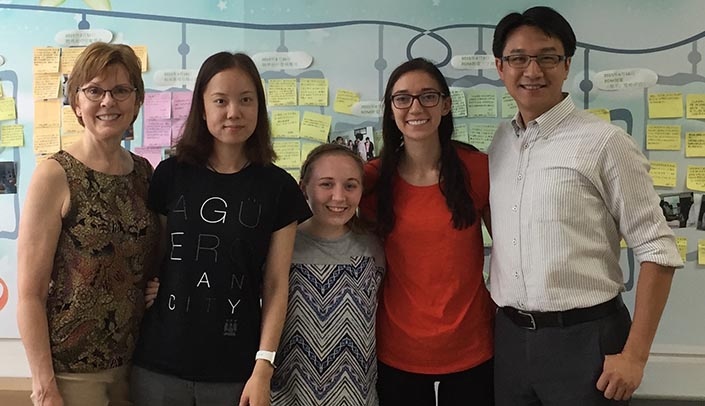In July, three College of Allied Health Professions physical therapy students were the first to participate in a short-term physical therapy exchange program with China.
They visited the Shanghai Sunshine Rehabilitation Hospital for three weeks (in addition to one week of cultural experience), rotating in a number of departments at the hospital. During their visit, they also traveled to occupational and speech therapy sites.
2018 PT Summer Program
Plans are being made for the 2018 Physical Therapy Summer Program in China. Interested PT students should contact Joseph Siu, Ph.D.
One goal of their visit was to gain a global understanding of rehabilitation, including differences and similarities between the United States and China.
Some differences stood out right away.
“Most patients have to wait a few months after an injury before getting treatment,” said student Danielle Nelson.
However, after they begin treatment, “patients have more and more frequent therapy than in the U.S.,” said student Meng Liu.
Student Katie Shalon said that in the U.S., rehabilitation focuses on the patient and what they want to be able to do.
“If they can’t flex their knee to 120 degrees, it doesn’t matter as long as they can do functional tasks,” she said. “In China, they focus more on correcting impairments and less on functional tasks.”
Another difference was the role of traditional Chinese medicine (TCM) in patient care. TCM includes acupuncture, cupping, herbal medicines and moxibustion.
“Most patients receive TCM during their rehabilitation,” Shalon said. “Patients generally go to physical therapy and occupational therapy for one to two hours, and they have TCM as a part of their daily rehab.”
Language barriers presented some difficulties. There were ways around these barriers, however.
“I learned just how important and helpful nonverbal language can be in the clinic,” Shalon said. “Our teachers at UNMC have said this before, but I never realized how useful it could be until it was the only language I could understand. I think that being skilled in this is irreplaceable, and I’m lucky to have been able to develop it while learning about a different culture.”
Joseph Siu, Ph.D., director of the MS-DPT Chinese program and associate professor of physical therapy education, was one of the organizers of the program.
“It is an exciting time for our D.P.T. students to visit China and experience the growth of rehabilitation service in China,” Dr. Siu said. “With the success of this program and support from our Chinese collaborators, including Tongji University and Sunshine Rehabilitation Hospital in Shanghai, this unique clinical education experience is no longer just a dream of our students.”

Very nice article on the Chinese exchange program. Great opportunity for the students. Congratulations on the successful launch of this new program!